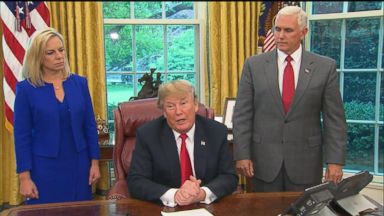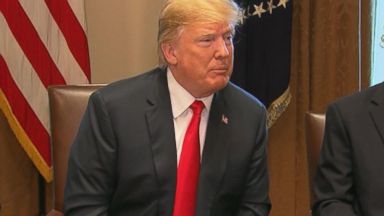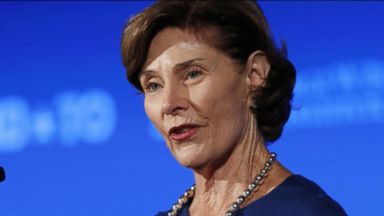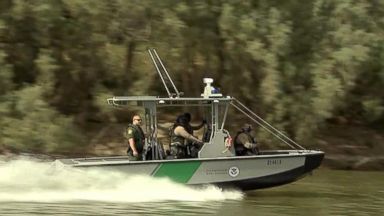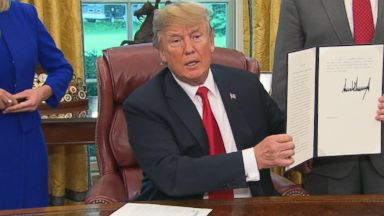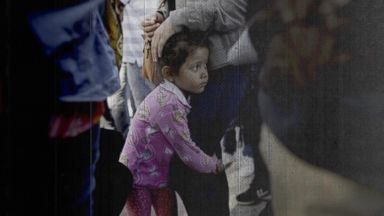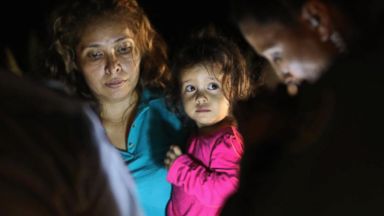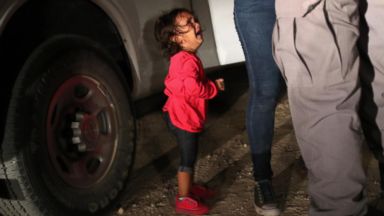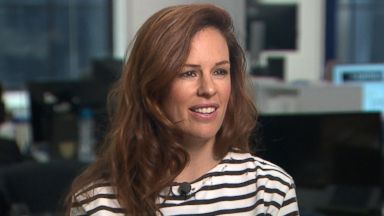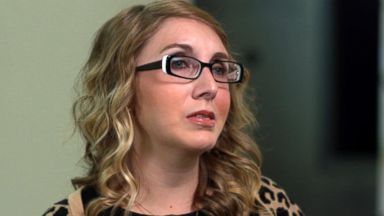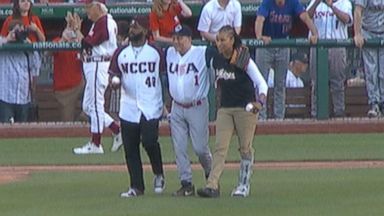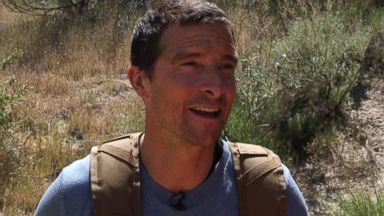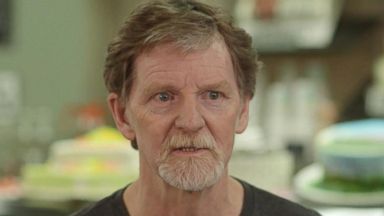President Trump signs executive order he says will keep immigrant families together
Coming up in the next {{countdown}} {{countdownlbl}}
Coming up next:
{{nextVideo.title}}
{{nextVideo.description}}
Comments
Related Extras
Video Transcript
Transcript for President Trump signs executive order he says will keep immigrant families together
Today I signed an executive order. We're going to keep families together. But the border is going to be just as tough as it's been. Reporter: After days of protests -- images that sparked outrage and mounting pressure, today president trump reacting signing an executive order to place an end to the separation of migrant families at the border. We are keeping a very powerful border and it continues to be a zero tolerance. We have zero tolerance for people that enter our country illegally. Reporter: But for the thousands of migrant children that have been separated from their families, there's month telling how many more nights they will have to spend alone. How difficult is it to reunify them? When the family arrives, you have one immigration case. When you separate them, you then create two separate immigrations. So now the child or children have one case, the parent has another. The parent can get deported and their children left behind. Reporter: It happened to 10-year-old Samuel. He spent the last eight months away from his family. In his red hoodie and blue backpack, a final piggy back ride with the American foster family he's lived with since October, in Guatemala he will reunite with his father who brought him here illegally and was deported. His foster parents are still fostering other children so we agreed not to show their faces, and not show Samuel's face until he's reunited with his family. He was almost in shock. He was afraid to eat, his clothes were soiled, he wouldn't use the bathroom when he was transported here. So he had urinated and defecated in his clothing. Samuel is just one of thousands of children experiencing this trauma, traveling countless miles only to be separated from their family. According to customs and border protection, over 2,300 children were separated from their families between may 5th and June 9th. Their separation as a result of the trump administration's zero tolerance policy crackdown on illegal border crossings that began last April. Thosep separated children were placed in the care of the department of health and human services, while their parents remain in the custody of the department of homeland security. But neither I.C.E. Nor HHS have numbers on how many parents have already been deported or how many families have been reunited. One of the lifelines, maybe the number some children have committed to memory, like 6-year-old Alison Valencia from El Salvador, seen here with her mother. After being separated, she begs a supervisor to call her aunt. Alison's aunt telling pro public licka the conversation with her 6-year-old kneels was the hardest moment in hi life, she's crying and begging me to go get her, she says, I promise I'll behave, but please get me out of here, I'm all alone. The haunting audio now a symbol of the suffering and confusion children endure when sarated from their parents. Child internment camps, that's what I said! Reporter: Sparking outrage among politicians. The president had a closed-door meeting with house Republicans to discuss immigration legislation. The president reportedly telling him ivanka showed images of children in detention facilities and encouraged him to end the policy. After exiting the meeting, he was confronted by several democratic congressmen. You're separating the children! Mr. President, don't you have kids? Reporter: Today's signing a striking reversal, just days ago -- We can't do it through executive order. President trump did exactly what he said he could not and would not do, he ended this policy with a stroke of a pen. It was a stunning reversal. Just days ago, he said he couldn't do this by executive order. Yet that's exactly what he did, completely proving himself wrong. So I imagine that even with this executive order that was just signed, you still don't believe that immediately these families are going to be reunified? No. My initial reaction is really gratified. They're going to stop taking children away. Following that, you have all of these questions. There are some parents, they're at county jail. There parents are at a detention facility. Then if the parent is in the detention facility, are we going to move the parent from a detention facility that is for adults to a detention facility that allows the parent to have a child? In a Normal situation that gets messy. Now we're talking about more than 2,300 kids. Correct. My hope is that they would reunite them. Reporter: For now the children remain separated. Some of the youngest children are being held here in Brownsville, Texas. One of at least three so-called tender age facilities. A visiting doctor saying she found traumatized children, one crying inconsolably. This woman sends deacons to pray with girls in that shelter. Every child gets up and begins to pray to god in a loud voice, please send me back to my parents, I want to see my mommy, I want to see my daddy. Reporter: Other children have been transported to the remote countryside of southern Texas. You can see it's on the other side of this green fencing here, there's a soccer field there with soccer goals. Then the actual facility off in the distance. Agencies like Bethany Christian services in Michigan struggling to reunite these families who have been spread across the nation. What's new about this is we're not sure how long it would take to reunite a child with a parent who's in a detention center. And so we would need contact with that parent. Usually when separations are unexpected, the parent may not have made a plan with another family member in the united States. Would you take our child if we weren't available? Or they maybe, you know, didn't prepare the child for that. Reporter: It was Bethany Christian services who placed Samuel with foster parents in Michigan. I do hear stories about the detention facilities. They talk about mats on the floor. Not a lot of food. And of course crying and fear. And most often they come extraordinarily dirty, lice, all sorts of things. Reporter: But those detention centers and the foster care are supposed to be temporary. The reason it took so long for Samuel to be reunited with his father that is Samuel had to go through the voluntary departure process. Which means that an immigration judge had to re-rule on his petition for voluntary departure. And then we needed to coordinate his departure with the embassy from his country and with I.C.E. So that he was appropriately reunified with his dad and safely reunified with his dad. Reporter: At the airport, a mix of emotions now that Samuel will see his father again. Samuel's foster family gets in their last kisses and promises that this good-bye isn't final. As an I.C.E. Agent takes Samuel through security, the 10-year-old without a family for his eight-hour journey. Children separated from their parents will have to go through getting that healing done. So the relationship with their family, with their parent, will they be able to trust that parent again? Reporter: Back in Guatemala, his father waits in tears. He tells my colleague Alex Perez that his heart is hurting. He says he's happy his son will be home soon after those eight months apart. "I may look like I'm okay, but my heart has been hurting because of this," he says. Reporter: Finally the tearful look in his eyes, confusion on his face. The room filled with government officials. Samuel overwhelmed. Appearing shell shocked going back to a family he loves, having to leave the American family he also loves. For "Nightline," I'm geo Benitez in El Paso, Texas.
This transcript has been automatically generated and may not be 100% accurate.
